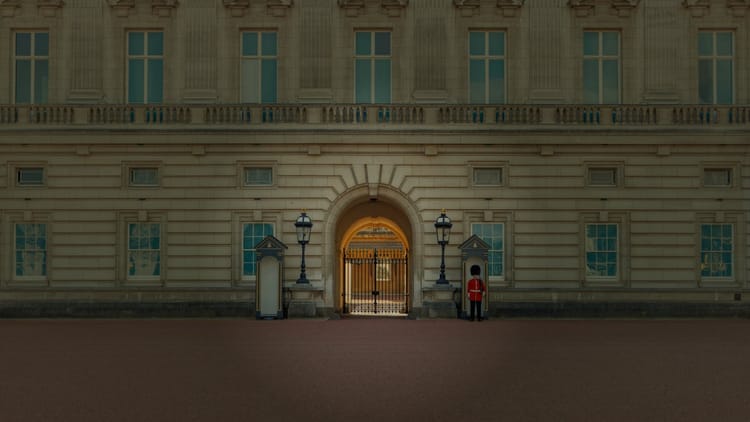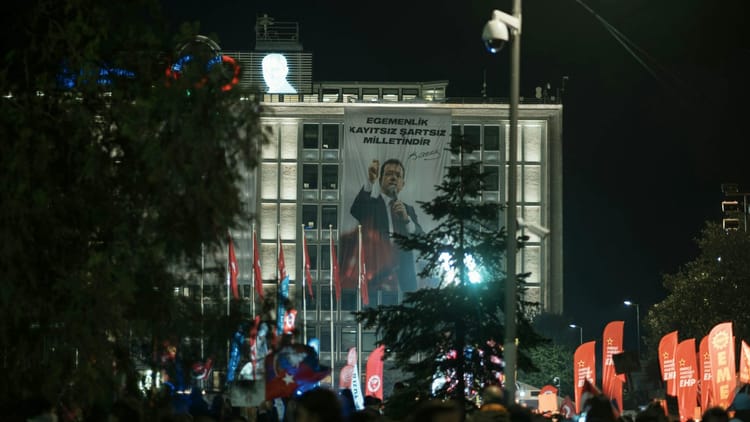Fire and brimstone

Recently: Ten Western countries* have now recognized Palestinian statehood since late Sunday. (* Nine as of yesterday, and now Andorra with them.) What does that mean?
Today: The American president reverses course, saying Ukraine can reclaim all territory from Russia. The U.S. Secret Service dismantles an illicit network menacing NYC cell towers. Local American TV stations boycott Jimmy Kimmel despite his show’s return. & The former Philippine strongman Rodrigo Duterte is charged with crimes against humanity at the International Criminal Court.
For members: What was Donald Trump trying to accomplish at the United Nations, telling his allies they’re committing civilizational suicide and the UN is a joke?
& New music from Anna of the North ...
Recalculating the odds
Following a remarkable speech at the United Nations on Tuesday, U.S. President Donald Trump stood alongside Ukraine’s President Volodymyr Zelenskyy and declared that Ukraine could win back all its territory from Russia—a stunning reversal from just five weeks earlier, when he spoke of “territory swapping” and suggested both sides would need to make territorial concessions. “I think Ukraine, with the support of the European Union, is in a position to fight and WIN all of Ukraine back in its original form,” Trump posted on his social-media platform, Truth Social, a half-hour later. Russia, Trump added, was “a paper tiger” whose economy was in “BIG trouble.”
The American president’s Alaska summit with Russia’s Vladimir Putin in August ended without agreement, after which Trump suggested territorial concessions from Kyiv would be inevitable. Putin has since shown no interest at all in meeting with Zelenskyy, while Moscow has intensified its bombardment of Ukraine. Russian aircraft have repeatedly violated NATO airspace in Poland, Romania, and Estonia—prompting Trump on Tuesday to endorse shooting down Russian planes that enter allied territory.
European officials described Trump’s comments as “head-spinning,” having received no advance warning of the policy shift. When asked if he still trusted Putin, Trump deflected: “I’ll let you know in about a month.” The reversal leaves unclear whether Trump’s approach represents a genuine strategic pivot or a tactical feint designed to increase pressure on Moscow. The distinction matters because one path suggests deeper American military involvement while the other, that Trump—the aspirational wartime deal maker—is just trying to turn up the heat on Putin.

Meanwhile
- The U.S. Secret Service announced Tuesday, ahead of the UN General Assembly, that it discovered 300 SIM servers in the New York region with more than 100,000 SIM cards capable of sending 30 million text messages per minute and disabling cell phone towers. Officials describe the illicit network as “one of the most sweeping communications threats uncovered on U.S. soil.”
- After Disney announced Monday that the American television comedian Jimmy Kimmel’s show would return to ABC following its suspension over remarks about the killing of Charlie Kirk, major TV station groups Nexstar and Sinclair—representing about a quarter of ABC’s local affiliates nationwide—said they would indefinitely boycott the late-night program. Brendan Carr, the chair of the U.S. Federal Communications Commission, said, “Local TV stations—not the national programmers—have public interest obligations, and they should be making decisions that in their view meets the needs of their local communities.”
- The International Criminal Court announced on Monday that the Philippines’ former president Rodrigo Duterte faces charges alleging his involvement in the killings of at least 76 people while he was president, and earlier a southern mayor. His confirmation hearing has been temporarily postponed after his lawyers claimed he has cognitive deficiencies that make him unfit for trial. According to his chief counsel, Nicholas Kaufman, “Mr. Duterte’s condition will not improve.”
Hungry for an alternative to dystopian anger? Join a gathering of code breakers, hackers, and puzzle solvers. You’ll leave optimistic—we promise.

Your loyal guide to a changing world.
Membership with The Signal means exclusive access to premium benefits:
- Regular profiles on the questions behind the headlines
- In-depth feature interviews with our network of specialist contributors from across America and around the world
- The despatch, our weekly current-affairs and cultural-intelligence briefing
- Early access to new products, including print extras
It also means vital support for an independent new enterprise in current-affairs journalism.
The city on a hill, 2025
What was Trump trying to accomplish at the United Nations, telling his allies that they’re committing civilizational suicide and the UN is a joke?
From the podium of the UN General Assembly Hall in New York City on Tuesday morning, U.S. President Donald Trump spent nearly an hour explaining to the leaders of its member states that the United Nations is a terrible institution and their countries’ policies would destroy them.
Trump called climate action “the greatest con job ever perpetrated on the world.” He told his European allies, "Your countries are going to hell”—because of immigration and energy policies. He said the UN has just been writing “strongly worded letters” that accomplish nothing while he’s been busy “ending seven wars.” The speech ran more than three times longer than the president’s allotted 15 minutes, as he read from paper notes after his teleprompter failed; it went off-script to attack disparate people and things, from London’s mayor to renewable-energy projects; and its seven-wars claim was only one of its many questionable if not outright false statements.
Meanwhile, remarkably, leaders from every allied country were sitting there in the General Assembly Hall while the president of the United States systematically attacked the philosophical foundations of the organization they’d come together to celebrate on its 80th anniversary.
All of which would seem quite stunning and—to invoke a word often invoked about the words and deeds of Donald Trump—unprecedented.
Is it?
- Previous attacks by U.S. presidents. Ronald Reagan called the United Nations a “dangerous place.” Presidents George Bush the Elder and Younger both complained about Security Council constraints. And Trump himself criticized the UN repeatedly in his first term. Yet historically, these complaints were about the UN’s effectiveness or procedures. They represented frustration with its bureaucracy, not a rejection of its core missions—and they certainly weren’t delivered from its podium.





